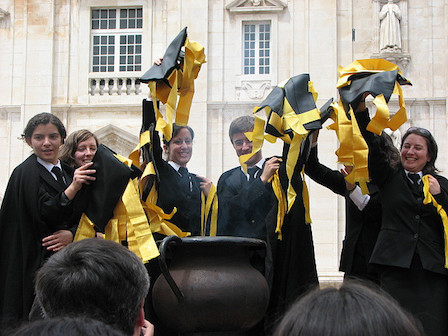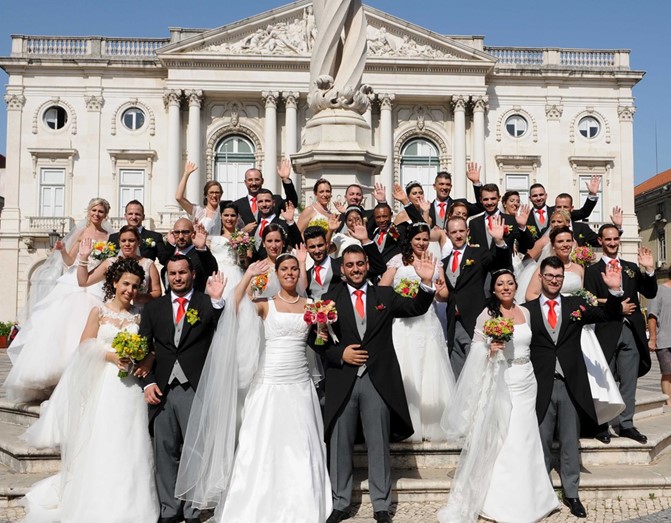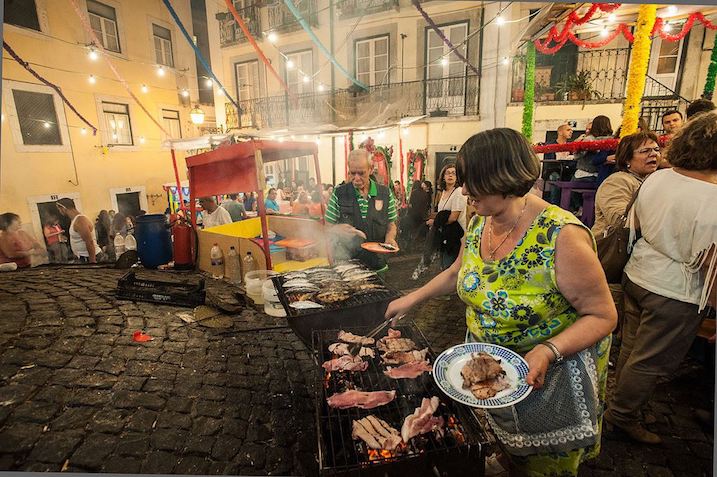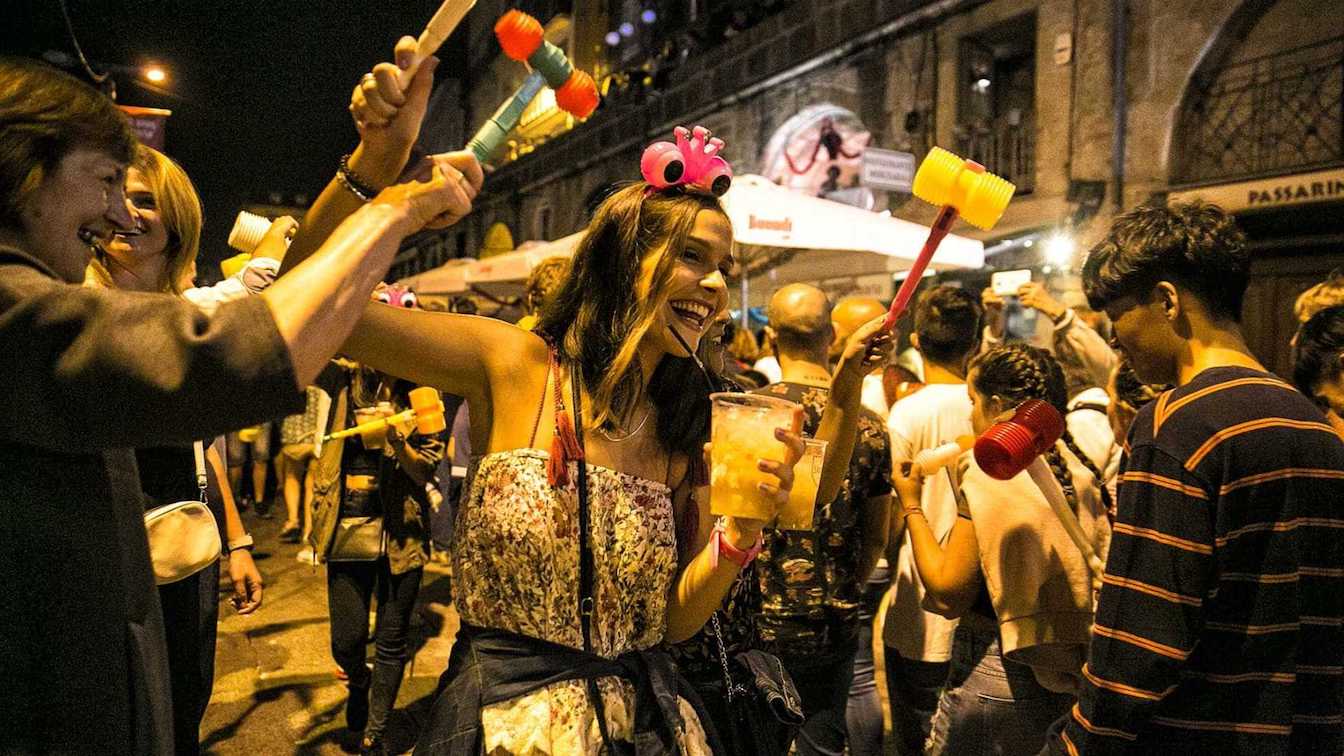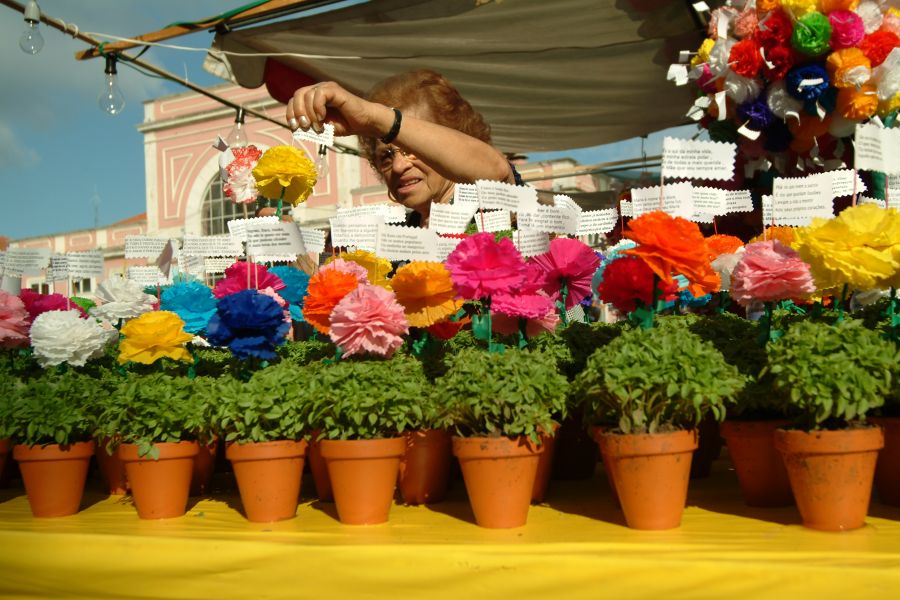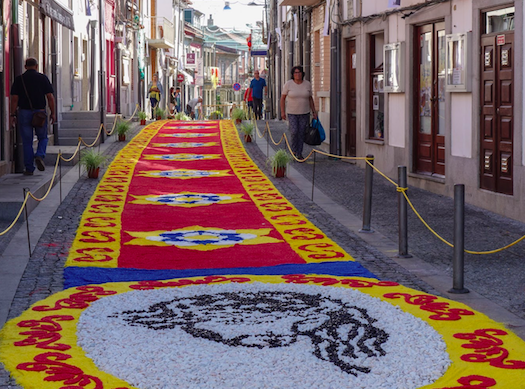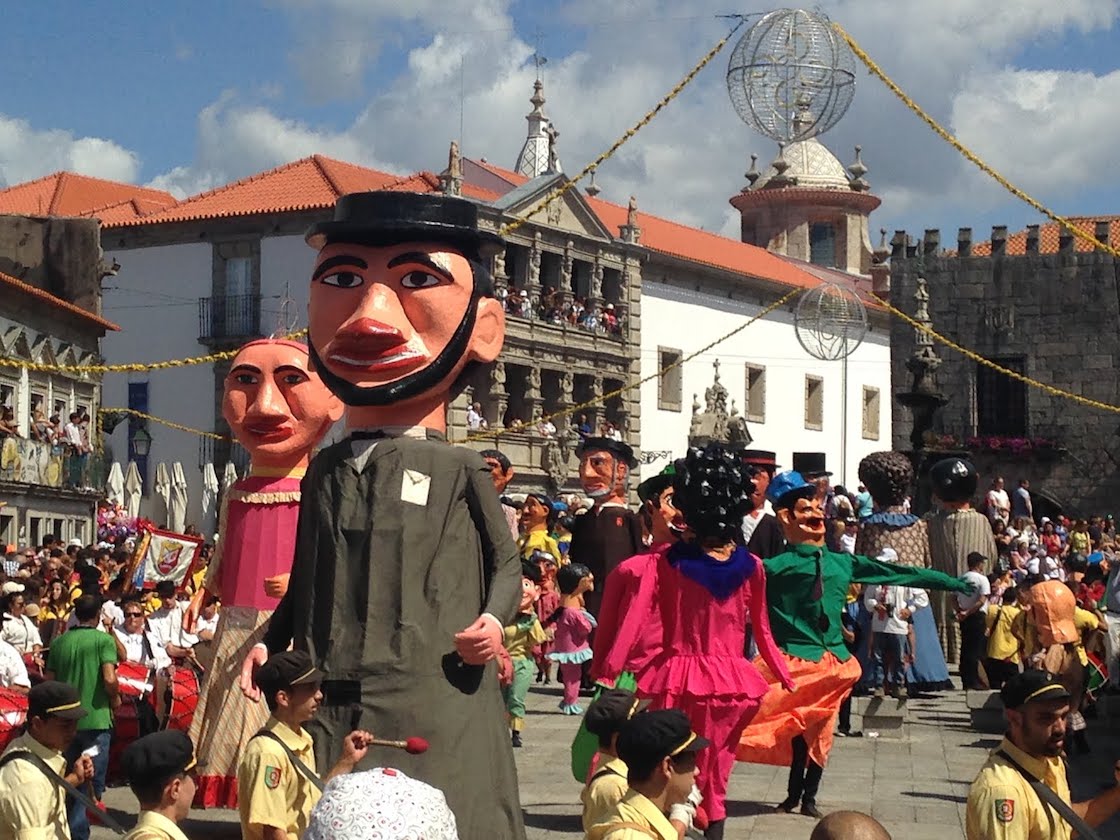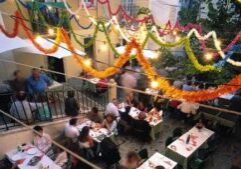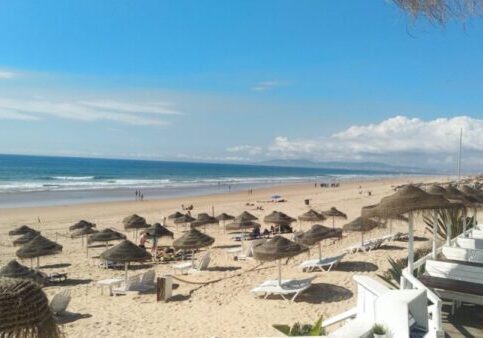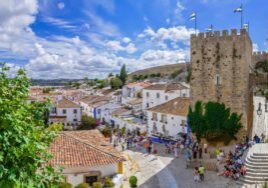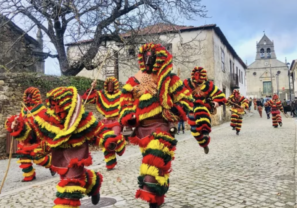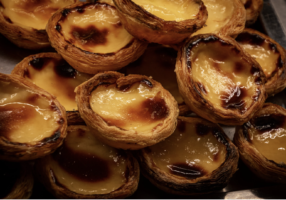The next 5 must-see popular festivals in Portugal
Portugal is a country where traditions and customs are deeply rooted, and for me, this is one of the things that makes the country so beautiful and interesting. So it’s hardly surprising that Portugal’s popular festivals are an integral part of the culture
Indeed, the Portuguese love to go out, dance, sing, share convivial moments… And this, all year round, from north to south, with numerous festivals that punctuate Portuguese life. But summer is the season par excellence for living and celebrating in the streets of Portugal!
With this in mind, I’d like to introduce you to the next 5 most famous popular festivals in Portugal, along with a few anecdotes about them. If you get the chance, I highly recommend taking part: these are ideal times to immerse yourself in Portuguese culture



1) Queima das fitas in Coimbra – May
The Queima das fitas, or “burning of the ribbons”, is a festival dedicated to the end of Portuguese university life, and takes place in May at the end of the academic year. This tradition exists in almost every university town in Portugal, but the festivities in Coimbra, the Portuguese university town par excellence, are the oldest and most renowned.
It has to be said that university festivities attract thousands of spectators. The Queima das Fitas salutes students at the end of their university studies. A great opportunity to get to know this student city and discover yet another Portuguese tradition. The festivities are punctuated by three key moments:
-
1.1- The “queima das fitas” (burning of the ribbons)
On entering university, Portuguese students receive a ribbon (” fita” in Portuguese ), the color of which corresponds to the discipline they are studying ( yellow for medicine, red for law, light blue for science, etc.). To symbolize the end of their student life, students burn this ribbon in a cauldron in front of Coimbra Cathedral.
Coimbra students burning their ribbons.
-
1.2- The “Serenata Monumental” (the serenade)
Still in front of the Cathedral, guitarists accompany Fado singers for a convivial moment.
-
1.3- The “cortejo” (procession)
Students dressed in their traditional black capes make their way through the streets of the city in floats decorated in the colors of each faculty. Students about to graduate, on the other hand, parade on foot, wearing hats and walking sticks in their university’s colors. It’s customary to cane these students’ top hats three times, to ensure that they continue to enjoy a successful professional life.
2) La Romaria de Fátima – May
The Romarias ( pilgrimages) to the Sanctuary of Our Lady of Fátima attract thousands of people. The main romaria is that of May 13, which celebrates the first apparition of Our Lady to three shepherd children in the village of Fátima in 1917.
In this spirit, numerous religious ceremonies take place on this occasion, particularly on the night of May 12-13. Pilgrims come to Fátima by every conceivable means of transport: donkey- or ox-drawn carts, bicycles, and some even kneel the last 200 meters to the Chapel of the Apparitions, following a marble route.
It’s worth noting that in Portugal, there’s an old tradition of kneeling to make a promise to God, or to ask for him. On May 13, the statue of Our Lady of Fátima is brought before the basilica, and over 500,000 pilgrims attend the celebration. In the evening, there is another torchlight procession.
Kneeling pilgrims arriving at the Sanctuary of Our Lady of Fatima.
3) Santo António celebrations in Lisbon – June
Santo António (priest, born in Lisbon) celebrations are very popular in Lisbon in June. They take place mainly in the capital’s neighborhoods ( Graça, Mouraria, Castelo, Alfama, Bairro Alto…), which, for the occasion, are decorated with garlands, multicolored lanterns and basilica pots.
In other words, there’s no shortage of entertainment, with concerts, fado shows, popular songs, street theater and exhibitions… But there are a few highlights to highlight:
-
3.1- The “marches
The famous popular marches take place on the night of June 12-13. These take the form of marching bands and the famous Avenida da Liberdade, the capital’s main thoroughfare.
-
3.2- The grand procession
Secondly, on June 13, a public holiday in Lisbon, the procession departs from the Santo António church, located in the Alfama district, right next to the Sé Cathedral and built on the former home of Santo António. The procession moves through the narrow streets of Alfama, and then returns to the church.
-
3.3- Santo António weddings
It’s said that if you get married on Santo António, you’ll have a happy marriage. Every year, 16 Lisbon couples are selected by the city council and their weddings are organized by the city. Those selected for these Santo António weddings can be found on the “Casamentos de Santo António” facebook page.
The Santo António bride and groom.
-
3.4- The altars
During the Santo António festivities, many altars are built, dedicated to this saint. A competition is held every year to choose the most beautiful altar. They are usually in the form of a staircase, decorated with flowers, a basilica and Santo António, and are shown at the very top.
-
3.5- Grilled sardines
There are also grilled sardines. In fact, the French often rename these festivities “les fêtes de la sardine”. But why? Quite simply because one of the characteristics of these festivals is the presence of barbecues set up in all the streets of Lisbon, on which sardines are grilled and served with bread, a glass of vinho verde and a little caldo verde soup, very typical of Portuguese festivals.
Grilled meats and sardines in the streets of Lisbon.
4) São João festivities in Porto – June
The São João festivities date back to the 14th century and were originally pagan festivals marking the summer solstice, and celebrating abundance and fertility. Later, they took on religious overtones. As a result, these festivities gather large numbers of people all over Portugal, but the city in which they are most prominent is Porto.
São João is the city’s patron saint. The historic center is decorated with balloons and colored paper. Since the festival culminates on the night of June 23 to 24, a vast program (folk groups, popular songs, processions , street entertainment, orchestras, exhibitions, processions…) takes place throughout the city in the weeks following São Joao. Several traditions and highlights punctuate these festivities, including the voices :
-
4.1- Tapping on the head
First and foremost, this tradition has its roots in pagan courtship rituals. For example, it was customary for participants to tap the heads of attractive girls with garlic flowers or leeks, symbolizing the start of a flirtation.
It has to be said that this tradition lives on, but the garlic flowers and leeks have been replaced by soft plastic hammers, and everyone taps and gets tapped on the head during this São João evening. By the way, there’s a little secret about this tradition: a love affair produced at the São João is said to last a lifetime, so make sure you select the people you hit on the head – one of them could be your soul mate.
People who hit each other with soft hammers during the São João.
-
4.2- Grilled sardines
As with the Santo António festivities in Lisbon, it’s typical to enjoy grilled sardines on broa (my favorite Portuguese bread) and caldo verde soup during these São João festivities.
-
4.3- The basil pot
It’s also customary to give a jar of basil to friends and family for good luck, often accompanied by a love or friendship poem. The person to whom you give it should keep it alive for at least a year, until the next festivities. ( A little tip for keeping it alive: never water the basil directly, but put a bowl of water under the pot and let the basil absorb the water! That was the gardening minute! )
A merchant selling pots of basil.
-
4.4- Fireworks
To round off the festivities, after dinner everyone heads to Avenida dos Aliados or Ribeira to watch the grand fireworks display near the mythical Douro River and Ponte Luiz I.
5) Viana do Castelo festivals – August
The Romaria ( pilgrimage ) of Our Lady of Agony is probably one of the most famous in Portugal. The romaria takes place over 4 days in August in Viana do Castelo, in northern Portugal, and attracts large numbers of people every year. Since the 18th century, fishermen have been praying to the Virgin Mary for calm seas. Highlights of the festival include:
-
5.1- The creation of salt carpets
On the evening and night before the sea procession, salt carpets, flowers and seaweed are created by the fishermen and their families for the sea procession the following day.
One of the salt carpets in the town of Viana do Castelo.
-
5.2- The cortejo (procession)
A parade designed to showcase the town’s customs is performed by 3,000 extras who parade for 2km through the streets of Viana do Castelo.
-
5.3- The Mordomia parade
400 local women dressed in colorful folk costumes and jeweled ornaments parade through the streets.
-
5.4- The “Gigantones” and “Cabeçudos” (big heads) parade
There are also giant puppets who dance in the various processions.
The Gigantones during the Viana do Castelo festivities.
-
5.5- The serenata
To conclude the festivities, a huge fireworks display takes place on the century-old bridge over the River Lima.
In conclusion
As you can see, popular festivities in Portugal are omnipresent, and even here I’ve only presented a tiny fraction of them. I strongly recommend that you take part in a few of them – you won’t be disappointed! There are festivals all year round, all over Portugal.
So, tell me, which Portuguese festivals will you be taking part in?
If you liked this article, please click on the “Like” button below. And don’t forget to follow us on our social networks: our Facebook group “Amoureux du Portugal”, our Facebook page “Vivre au Portugal” and our Instagram “Vivre au Portugal” our Facebook page ” Vivre au Portugal” and our Instagram “Vivre au Portugal”.
Articles Populaires
dernières annonces

2 bedroom apartment with sea view, 10km from Lisbon and 2km from the beaches
Rua da Bica, 103Discover this magnificent 2 bedroom apartment with views of Arriba Fóssil and the sea, 2km…
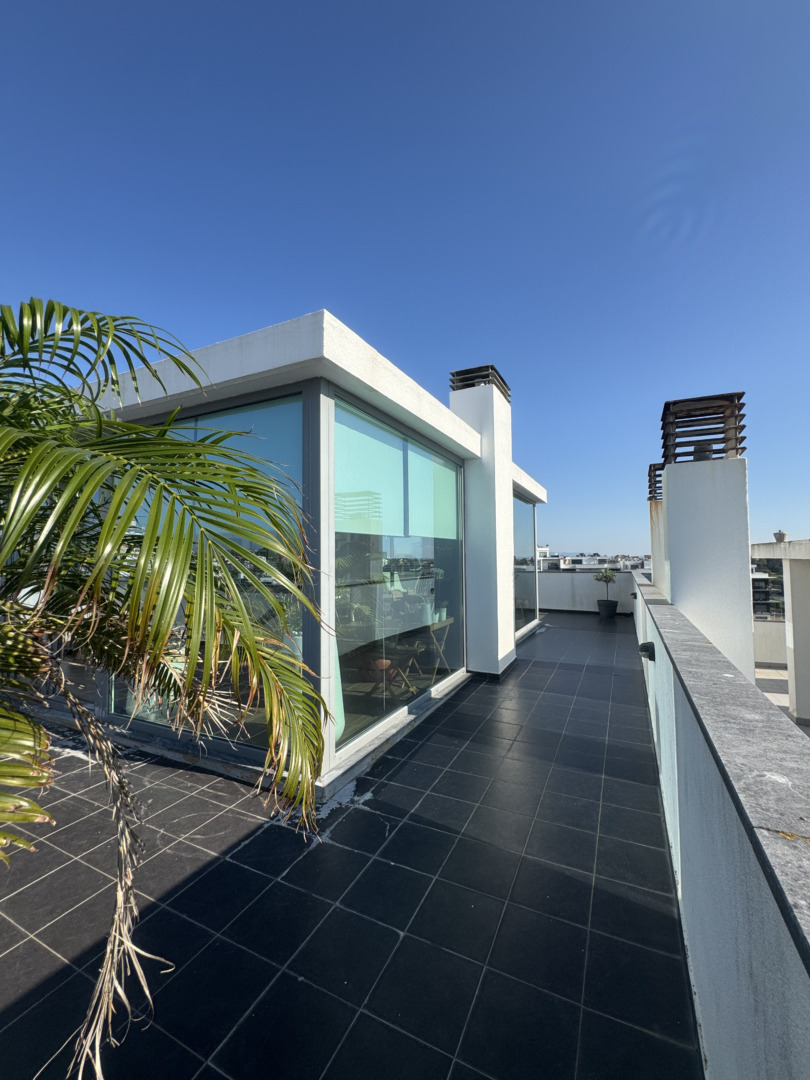
Duplex apartment with sea view 15 minutes from Lisbon
rua Santa Teresa 7Bedroom + duplex apartment with sea view and 15 minutes from Lisbon.

Single-storey house with swimming pool
Just a few meters from the magnificent bay of São Martinho do Porto, lies this…
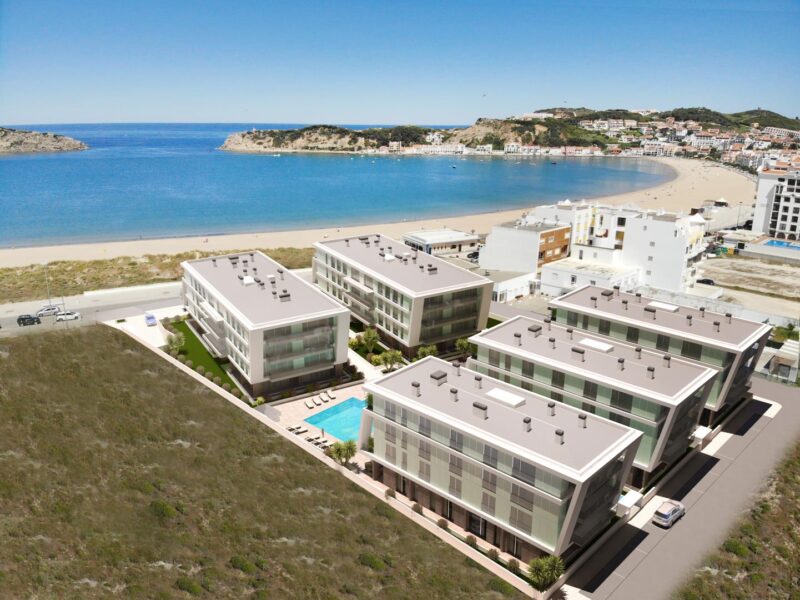
Condominium apartments facing the sea
São Martinho do PortoBeautiful apartments in São Martinho do Porto “Janela da Baía”! Located in the heart of…

Villa already finished and ready to move in: 4-suite bungalow on 750m2 plot in a quiet area of Azeitão
Rua de ParisHouse already finished and ready to move into! Close to shops and services, quick access…

Magnificent house with basement, indoor and outdoor pool in Verdizela/Aroeira
Verdizela/AroeiraNew turnkey project: magnificent single-storey villa, 498m2 in surface area, high-end finishes on a 1875m2…

Luxury apartment on the edge of a nature reserve
Your modern, spacious apartment between the beach and Lisbon’s capital. – Beach 5min – Golf…
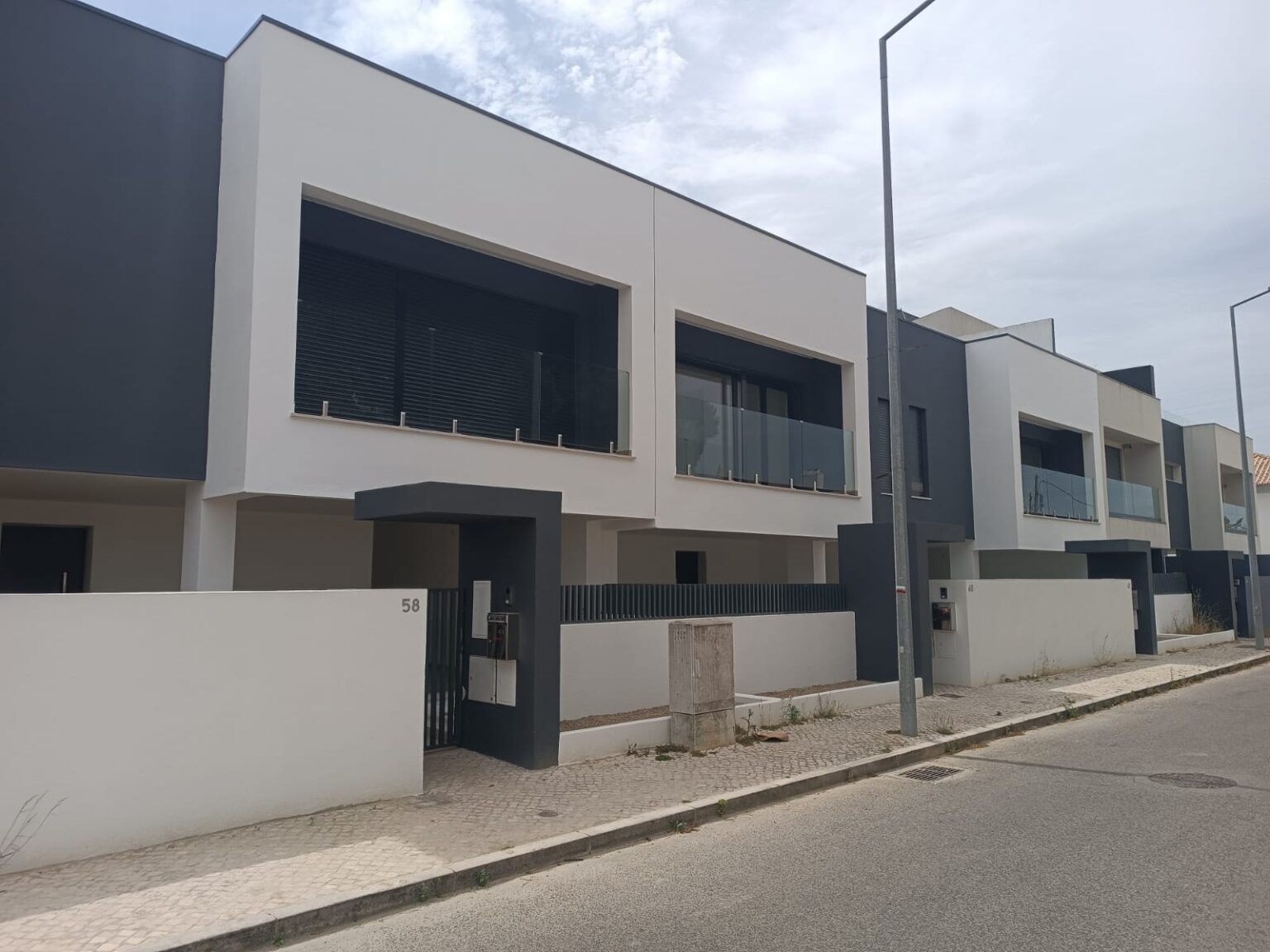
House T3 1 10 min from Lisbon and 5 min from the beaches
PêraREADY TO MOVE IN! New T3 1 ready-to-live-in house in a quiet, rural neighborhood with…

4 bedroom villa with pool and jacuzzi in Aroeira
rua são miguelModern, minimalist architect-designed house with exceptional details in a quiet location in Aroeira 2-storey house…
Inscrivez-vous à notre newsletter
Recevez chaque mois les derniers articles de notre blog "la vie au Portugal" et notre sélection de biens immobiliers à vendre.

